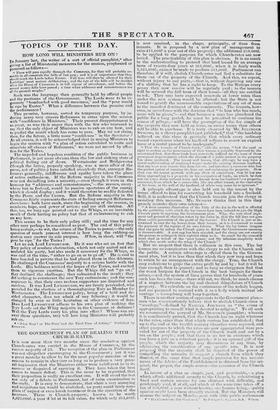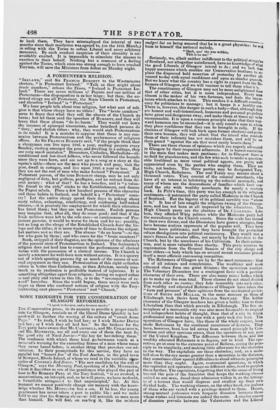THE GOVERNMENT PLAN OF DEALING WITH CHURCH-RATES.
Fr is now more than two months since the resolution against Church-rates was carried in the House of Commons, by the isarrow majority of 23. The reception of the plan in Parliament was not altogether encouraging to the Government ; yet it was a great mistake to allow by the the most popular measure of the session to remain in abeyance so long as to produce a very gene- ral impression that the Ministers either were indifferent as to its success or despaired of carrying it. They have taken the best course to insure defeat. This is the mote to be regretted, that their proposition is really an excellent one. It will stand the test not only of a debate in Parliament, but of calm examination in the study. It is easy to demonstrate, that while a very annoying and iniquitous tax would be abolished, no party could fairly com- plain of unjust or even harsh treatment from the operation of the measure. There is Church-property, known to be worth 1,323,000/. a year if let at its full value, for which only 261,000/. Fr is now more than two months since the resolution against Church-rates was carried in the House of Commons, by the isarrow majority of 23. The reception of the plan in Parliament was not altogether encouraging to the Government ; yet it was a great mistake to allow by the the most popular measure of the session to remain in abeyance so long as to produce a very gene- ral impression that the Ministers either were indifferent as to its success or despaired of carrying it. They have taken the best course to insure defeat. This is the mote to be regretted, that their proposition is really an excellent one. It will stand the test not only of a debate in Parliament, but of calm examination in the study. It is easy to demonstrate, that while a very annoying and iniquitous tax would be abolished, no party could fairly com- plain of unjust or even harsh treatment from the operation of the measure. There is Church-property, known to be worth 1,323,000/. a year if let at its full value, for which only 261,000/. is now received, in the shape, principally, of fines from tenants. It is proposed by a new plan of management to raise 511,000t a year out of this property; the additional 250,0001. to be applied to the purposes for which Church-rates are now levied. The practicability of this plan is obvious. It is an insult to the understanding to pretend that land leased for an average term of twenty-four years at 26I,000/., when it is fairly worth 1,323,000/., cannot be made to produce 511,000/. Parliament can therefore, if it will, abolish Church-rates and find a substitute for them nut of the property of the Church. And this, we repeat, without injury to any party,—that is, without depriving any one of a shilling that he has a right to keep. To the Bishops every penny they now receive will be regularly paid ; to the tenants will be secured the full term of their leases—all they are entitled to ask. They may have expected renewals at lower rates than under the new system would be allowed; but the State is not bound to gratify the unreasonable expectations of any set of men to the manifest detriment of the community. The tenants, how- ever, in accordance with the doctrine that " to him who has much, more will be given,"—and that because a man has plundered the public for a long period, he must be permitted to continue his course of pillage,—will have the preeniption of the fee simple of the property they now held on lease, on easier terms than others will be able to purchase. It is truly observed by Mr. JELINC,ER SYMONs, in a clever pamphlet just published,* that " the hardship inflicted on this class is precisely that which every ordinary tenant experiences when his landlord refuses to renew an expired lease at a rental proved to be inadequate." " That the tenants of Church-lands," adds the writer, " had the smal ce right to reckon on the permanence of their tenure, i palpably disproved by the ascertained fact, that those lands have In:aerially suffered for the waut of those permanent improvements which the absence of a stable interest in the property bas alone primitive& 'File tenant well knows, that although he may have a moral understanding of continued tenure under the existing diocesan landlord, that any hour may remove him from his gee, and introduce a successor who has the perfect option of running the lives out and reclaiming the property. How then eau the tenant pretend, with any show of consistency, that he has any thing approaching to a poverty in his orcupation of lands, on which he dare not cut a tree 1own without leave and licence from his landlord ?—a property, moreover, from which be is aemovable, like any other tenant, at the expiration of his lease, at the will of the landlord, of whose very name he is ignorant."
A palpaple advantage is also held out to the tenant by the terms offered to him for converting his leasehold into a freehold.
Still, it is understood that the Church tenants join the clergy in resisting this measure. Mr. SyMONS thinks that in this they grossly mistake their own interest- " A most amusing illustration of the fable of the fox in the well is afforded by the gullibility with which the lay lessees have been induced to join the High Church party in opposing the Government plan. Why, the very chief argu- ment and ground of objertion taken by the latter is, that the bill does not give them entire possession of the profit of the lessees! The Chinch is just as de- termined to oust the lay lessees from their tenure, as it is determined to resist the payment of the repairs of its own fabrics. What the lay lessees imagine they can gain by aiding the Church party to defeat the Government measure, is inconceivable. A nest-egg has been revealed, and the clergy are not exactly the persons to relinquish their rightful claim to it So much for the crocodile tears shed in behalf of the • poor lessees,' and the iofantine simplicity with which they nestle under the wing of the Church !" But we suspect that there is collusion in this case. The lay lessees are ececonspirators with the clergy to rob the Church and the public. A certain advantage is offered them by the Govern- ment plan, but it is less than that which they now reap and hope to retain by an arrangement with the clergy. True, the Church may endeavour to gripe the entire profit by and by : but it will be time enough then to quarrel; and as long as clergymen find that the worst bargain for the Church is the best bargain for them- selves,—and the system of fines proves that for hundreds of years such has been the case,—there will not, we think, be much chance of a rupture between the lay and clerical dilapidators of Church property. We calculate on the continuance of the unholy league, and are prepared to contend with it as a bcily which mutual ad- vantage in wrongdoing will keep together. There is another section of opponents to the Government plan— men who conscientiously believe that to abolish Church rates is "sacrilege"—defined by SAMUEL JOHNSON as "tire crime of appropriating to oneself what is devoted to religion." To all such we recommend the perusal of Mr. SYMONs'S pamphlet ; wherein it is conclusively proved, that the Church has no right whatever to the rates, other than that which custom has established ; that up to the end of the twelfth century churches were repaired, and other purposes to which the rates are now appropriated were pro- vided for out of the property of the Church itself, and not by a tax on the people; and that there is no law in existence which can force a rate on a reluctant parish : it is an optional gift of the people, which the majority may discontinue at any time, by adjourning the consideration of any specific rate. It is now propose fi that the tnajority shall be deprived of the power of compelling the minority to support a church from which they dissent, at the same time that ample provision for the mainte- nance of the fabrics of the Establishment is obtained from the ori- ginal, the proper, the ample source—the revenues of the Church itself.
In favour of a plan so simple, just, and practicable,—a plan which affords additional security to the Church, by substituting a fixed and certain income for one obtained with difficulty, and grudgingly paid, if at all, and which at the same time takes off a tax of 250,0001. a year without hurting one human lwing,—public opinion might have been strongly excited. But the Ministers will resume the subject on Mondav,snext with little public eatlinsiasm • " The Churelerate 11111 Vhatical ea." By Jelinvr C. 5 asur. ILA.
to back them. They have misemployed the interval of two months since their resolution was agreed to, (on the 16th March,) in siding with the Tories to refuse Liberal and carry arbitrary measures. By such conduct suspicion of their sincerity is un- avoidably excited. It is impossible to stimulate the masses to exertion in their behalf. Nothing but a remnant of a feeling against the Tories, which once was strong enough to have crushed Tory ism, will save the Ministers from defeat on Monday night.



























 Previous page
Previous page